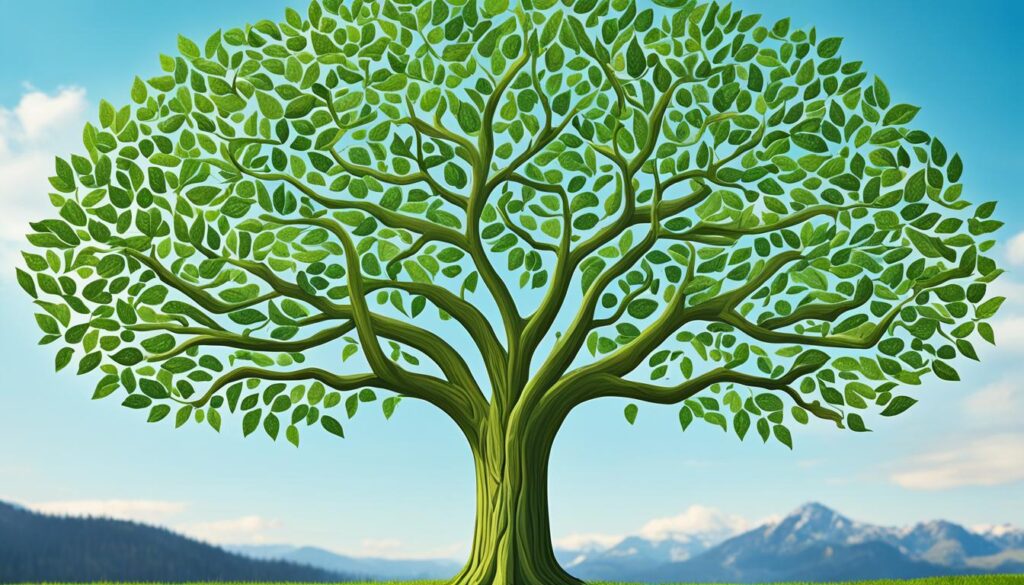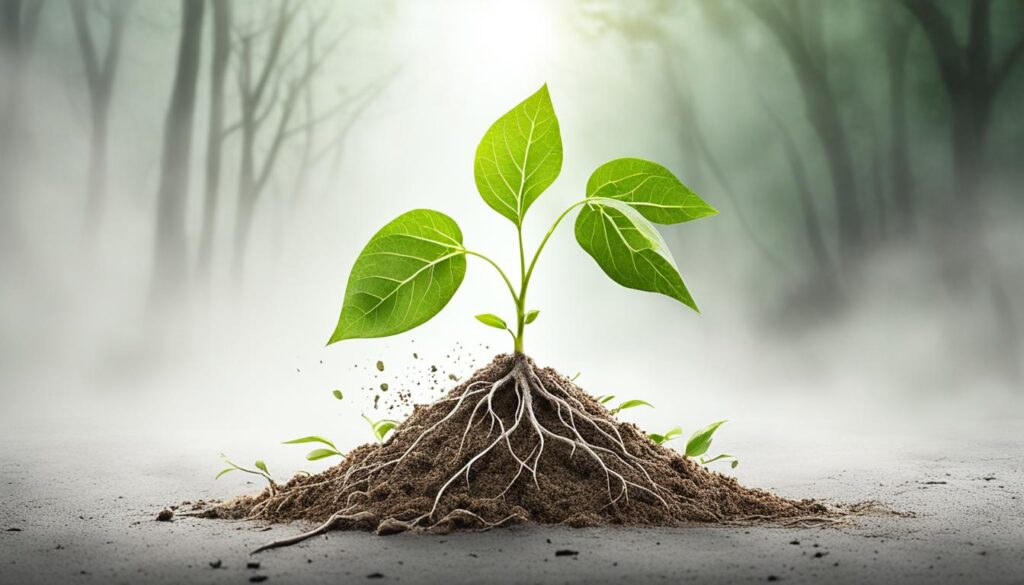
This guide will take you on a journey to become your best self. You’ll learn practical strategies and how to reflect on yourself. You’ll also discover holistic well-being practices to unlock your true potential. This journey will help you improve your mindset, boost your emotional smarts, and find your life’s purpose.
It will give you the tools and insights to face challenges, build resilience, and live a fulfilling life. So, get ready to start your path to becoming the best version of yourself.
Key Takeaways
- Develop self-awareness to understand your values, strengths, and weaknesses.
- Cultivate a growth mindset to embrace challenges and continuous learning.
- Enhance emotional intelligence to manage emotions and build stronger relationships.
- Practice mindfulness to reduce stress and increase well-being.
- Nurture resilience by developing coping strategies and a strong support network.
Embrace Self-Awareness
Self-awareness is key to personal growth and change. It’s vital to know your personal values and your strengths and weaknesses. This knowledge helps you make choices that match who you are.
Understanding Your Values
Figuring out your personal values is important for self-awareness. These values guide your choices and set your priorities. Think about what’s most important to you and how you want to be in the world.
By knowing your values, you can make sure your actions match your true self.
Recognizing Your Strengths and Weaknesses
Self-awareness also means knowing your strengths and weaknesses. Notice your talents and how you naturally excel. Use these to your advantage.
It’s also key to know your limits and what you need to work on. This helps you make smart choices and grow personally.
Self-awareness is a journey, but it’s worth it. Knowing yourself well lets you live truly, make good choices, and reach your full potential. Start this journey and find the best version of you.

“The greatest thing in the world is to know how to belong to oneself.”
– Michel de Montaigne
Cultivate a Growth Mindset
Having a growth mindset is key to overcoming hurdles and reaching your highest potential. It means moving from a fixed mindset that limits you to one that welcomes challenges. This mindset sees failures as chances to learn and grow, leading to ongoing personal development.
Carol Dweck, a famous psychologist, says people with a growth mindset believe their skills can grow with effort and a desire to learn. They see failures as ways to get better, not as permanent blocks. On the other hand, those with a fixed mindset think their talents and smarts don’t change, making them afraid of failure and hesitant to try new things.
To get a growth mindset, notice how you think when faced with a challenge. Do you quit or see it as a chance to learn? Do you shy away from risks or dive in to improve your skills?
- Change how you talk to yourself: Instead of saying “I can’t do this,” say “I can’t do this yet.” This small change can greatly affect your mindset.
- See mistakes as valuable lessons: Treat errors and setbacks as feedback to get better, not as failures. Use them as chances to learn and try again.
- Love learning: Look for new challenges and ways to grow your knowledge and skills. Learn with curiosity and a readiness to explore new ideas.
By changing your mindset to a growth-focused one, you can reach your full potential and overcome any obstacle. Remember, personal growth is a continuous journey, and a growth mindset is your best tool.

“Success is not final, failure is not fatal: It is the courage to continue that counts.” – Winston Churchill
| Fixed Mindset | Growth Mindset |
|---|---|
| Believes abilities are static | Believes abilities can be developed |
| Avoids challenges out of fear of failure | Embraces challenges as opportunities to learn |
| Sees effort as a sign of weakness | Sees effort as a path to mastery |
| Ignores feedback and criticisms | Seeks feedback and learns from mistakes |
A Guide To Surviving And Thriving As Your Best Possible Self
Life’s ups and downs can be tough, but you can get through them and even do great. We’ll look at how to turn obstacles into chances for growth. We’ll also talk about keeping a lifelong commitment to learning and getting better.
Reframing Challenges as Opportunities
It’s easy to see hard times as just negative. But, by changing how you think, you can see them as ways to learn and get better. Surviving and thriving means being strong and flexible in your thinking.
- Identify the lessons and insights hidden within your challenges.
- Develop a problem-solving approach to tackle obstacles head-on.
- Celebrate your progress and celebrate small victories along the way.
Embracing Continuous Learning
In today’s fast-changing world, personal growth strategies and lifelong learning are key to doing well. Make a promise to yourself to always be looking for new knowledge and ways to get better in your life and work.
- Engage in regular self-reflection to identify areas for growth.
- Explore new hobbies, courses, or learning opportunities that interest you.
- Surround yourself with people who challenge and inspire you to aim higher.
Remember, getting to be your best self is a journey, not a finish line. By seeing challenges as chances and always learning, you’re on your way to doing well in all parts of life.

Develop Emotional Intelligence
Emotional intelligence is key to growing personally and building strong relationships. This part talks about managing your feelings, being empathetic, and improving your social skills. These skills help you feel better and make your personal and work relationships stronger.
Managing Emotions Effectively
Starting with emotional intelligence means knowing and controlling your feelings. By understanding your emotional triggers and finding ways to manage them, you can handle tough situations better. This helps you interact with others in a more positive way.
Building Empathy and Social Skills
Next, it’s important to be empathetic to improve your social smarts. By paying attention to others’ feelings and thoughts, you can make deeper connections. Getting better at listening, communicating, and solving conflicts can help you build lasting relationships.
“Emotional intelligence is the ability to sense, understand, and effectively apply the power and acumen of emotions as a source of human energy, information, connection, and influence.”
— Robert K. Cooper, author and leadership consultant
By working on emotional intelligence, you gain a deeper understanding of yourself and others. This leads to more rewarding personal and work relationships. Remember, getting better is a continuous process. With the right mindset and strategies, you can thrive and become your best self.
Practice Mindfulness
Mindfulness is the art of living in the present moment. It helps us find inner peace, reduce stress, and improve our well-being. By focusing on now, we can stop worrying about the past or future.
Studies show that mindfulness has many benefits. It can improve focus, help manage emotions, and even boost physical health by lowering stress. If you want to handle anxiety, improve relationships, or just enjoy life more, try mindfulness.
Practical Techniques for Mindful Living
It’s easy to start practicing mindfulness. Here are some simple steps:
- Try mindful breathing exercises. Just focus on how air moves in and out of your body for a few minutes each day.
- Do mindful walking. Notice how your feet touch the ground and how your body moves.
- Make time for a mindful meditation session, even if it’s just a few minutes a day.
- Bring mindful awareness to everyday tasks like washing dishes or eating. Focus on the moment fully.
Start small and be consistent. Mindfulness is a skill that grows with time and practice. It leads to less stress, better focus, and a happier life.
“Mindfulness is the aware, balanced acceptance of the present experience. It isn’t more complicated than that. It is opening to or receiving the present moment, pleasant or unpleasant, just as it is, without either clinging to it or rejecting it.”
– Sylvia Boorstein
| Benefits of Mindfulness | Mindfulness Techniques |
|---|---|
| Reduced Stress | Mindful Breathing |
| Improved Focus | Mindful Walking |
| Enhanced Emotional Regulation | Mindful Meditation |
| Better Physical Health | Mindful Awareness |
Nurture Resilience
Resilience is key to doing well in life’s ups and downs. By learning how to cope and building a strong support network, you can get back on track after tough times. This helps you handle life’s challenges smoothly.
Developing Coping Strategies
People who are resilient use healthy ways to deal with stress and hard times. Some good ways include:
- Practicing mindfulness and meditation to find peace inside
- Doing regular exercise to let out stress and feel better
- Keeping a gratitude journal to stay positive
- Getting help from professionals when you need it for your mental health
Building a Support Network
Having a strong support system is key to being resilient. Be around people who lift you up and support you, like close friends, family, or a caring community. These meaningful connections give you emotional, practical, and social support when things get tough.
| Coping Strategies | Benefits |
|---|---|
| Mindfulness and Meditation | Reduce stress, enhance emotional regulation |
| Regular Exercise | Boost mood, release tension |
| Gratitude Journaling | Cultivate positive mindset, increase well-being |
| Professional Help | Address mental health concerns, develop coping skills |
By working on your resilience with good coping strategies and a strong support network, you can get through tough times. You’ll come out stronger, more capable, and ready to live your best life.
“The greatest glory in living lies not in never falling, but in rising every time we fall.” – Nelson Mandela
Prioritize Self-Care
It’s key to put self-care first to be our best selves. Our well-being includes our physical, mental, and emotional health. By adding self-care to our daily life, we get a better work-life balance. This helps us feel truly well.
Healthy living is a big part of self-care. It means eating right, exercising, and getting enough sleep. Taking care of our bodies helps us face life’s challenges with more energy and strength.
Handling stress is also crucial. Our lives are busy, filled with work, family, and personal tasks. Mindfulness, relaxation, and setting limits help us deal with stress better. This makes life smoother and calmer.
Putting self-care first is vital for living well. Finding a balance between work and personal life brings us more happiness, strength, and joy. It makes life richer beyond just getting through each day.
“Take care of your body. It’s the only place you have to live.” – Jim Rohn
Find Your Purpose
Finding your life’s purpose is a journey that changes everything. It brings more fulfillment and meaning. We’ll help you find your passions and match your actions with your core values. This way, you can live a purpose-driven life.
Identifying Your Passions
Start by looking into what you’re most passionate about. Think about what activities or topics make you feel alive. What do you naturally want to do? What makes you happy and excited?
- Make a list of the things you’re truly passionate about.
- Reflect on the times when you’ve been most engaged and energized.
- Consider how you can turn your passions into meaningful pursuits.
Aligning Your Actions with Your Values
After finding your passions, make sure your daily actions match your core values. Living by your values gives you a deeper sense of purpose and authenticity.
- Identify your core values, such as integrity, creativity, or service.
- Look at how your current life reflects those values.
- Change your life to match your values better.
By finding your passions and living by your values, you’re on the way to a purpose-driven life. It’s fulfilling and meaningful. Remember, this journey is ongoing. Be open to growth and exploration.
Build Healthy Habits
Growing personally means building healthy habits. These habits help you reach your best potential. This includes eating well, exercising, sleeping well, and managing your time well. This guide will show you how to make a lifestyle that supports your health and growth.
Nutrition is key to healthy habits. Eating foods full of nutrients boosts your energy and brain power. Try adding more fruits, veggies, lean meats, and whole grains to your meals. This will help fuel your body and mind.
Exercise is also vital. It can make you feel happier, keep your heart healthy, and help your body work right. Find activities you like, like walking, yoga, or lifting weights. This makes it easier to keep doing them.
- Prioritize a balanced, nutrient-rich diet
- Engage in regular physical activity that you find enjoyable
- Establish a consistent sleep routine and aim for 7-9 hours of quality rest per night
- Implement time management strategies to optimize your productivity and reduce stress
- Explore mindfulness practices to cultivate present-moment awareness and emotional regulation
Adding these habits to your life sets you up for a healthy lifestyle. It helps you grow personally. Remember, small steps over time can lead to big changes.
“The secret of getting ahead is getting started.” – Mark Twain
Embrace Holistic Well-Being
Living your best life means taking care of your whole self. This includes your mind, body, and spirit. We’ll look at ways to balance these areas for a fulfilling life.
Balancing Mind, Body, and Spirit
Your health is a journey with many parts. It’s key to look after your mind, body, and spirit. Holistic well-being is more than just staying fit or feeling good mentally. It’s about connecting your mind, body, and spirit.
Integrating Practices for Optimal Health
- Try mindfulness and meditation to find peace and emotional strength.
- Eat well and stay active to keep your body healthy.
- Discover integrated health practices like yoga or tai chi to connect your mind and body.
- Make time for self-care, such as writing, art, or nature walks.
By using a holistic approach and adding these practices to your life, you can feel balanced and resilient. Start this journey and become the best version of yourself.
“The greatest wealth is health.” – Virgil
We’ve reached the end of our journey, and we’re sure you’re ready to be your best self. You’ve learned about self-awareness, growth mindset, emotional intelligence, and resilience. Now, you have a plan to reach your full potential.
The path to personal growth never stops, but you can make big changes with the right mindset and effort. By focusing on your mind, body, and spirit together, you’ll feel more alive and happy.
It’s time to move forward. Think about what you’ve learned and what you want to work on. Make a plan to improve your habits, find your purpose, or take better care of yourself. Take action and change for the better.
The future is yours, so make it great and be the best you can be.


